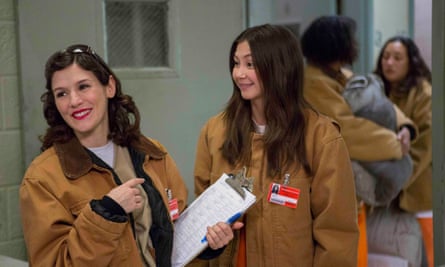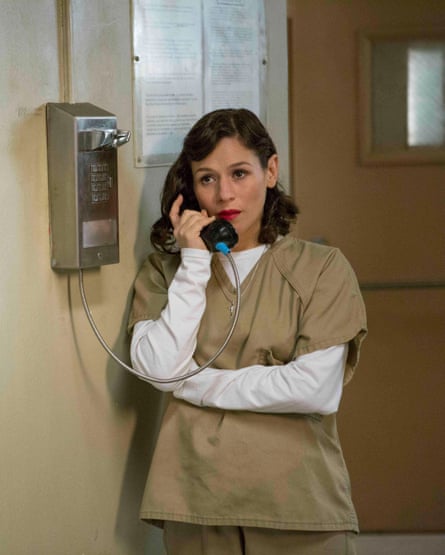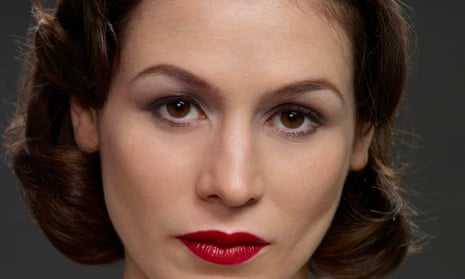Yael Stone was 10 and performing in a school competition when she recited Robert Browning’s Porphyria’s Lover, a poem about a man strangling a woman, as fellow students sang pop songs and gave Bible readings. At 15, she filmed her first sex scene, partnered on-screen with a much older man in the Australian miniseries, The Farm. She had not yet had sex in real life.
When friends and grandparents gathered to watch the show at the family home in Rozelle, Sydney, it hadn’t occurred to Stone they would be watching her – this virgin teenager – simulating sex. Her art-loving parents – an architect father and nurse mother – took her acting ambitions seriously and never judged her.
“I’ve been making my family watch awkward things for a long time now,” says Stone down the phone from Queens, New York, where she now lives with her husband, fellow Australian actor Dan Spielman.
The elfin 30-year-old, just 152cm tall, recalls as “funny and easy and nice” filming a fisting and oral sex scene in the prison chapel in Orange is the New Black. Easy, she says, because of her friendship with Natasha Lyonne, the actor who plays her prison girlfriend, Nicky Nichols – the role for which Stone initially auditioned.
Much has been made in Orange’s third season about the arrival of Australian actor Ruby Rose, but there has been another Aussie in the series from episode one of the first season. Stone plays Italian American inmate Lorna Morello, unrecognisably Australian thanks to her “crazy east-coast cocktail” accent – Stone’s own hard-to-place concoction of nasal Brooklyn and Boston vowels.
This season elevates Stone from recurring to regular billing, and she’s keen to sign on for a fourth series. Rose recently tweeted of her Aussie co-star: “She is the sweetest most beautiful kind human. Maybe she isn’t human maybe she is an angel. I adore her.” Adoration goes on both inside and outside the walls of Litchfield Penitentiary – from mute Norma, around whom some of the inmates establish a religious cult this season, to the sometimes obsessed Twitter followers of Orange is the New Black’s cast.
Adapted from Piper Kerman’s bestselling memoir, the Netflix series has always dodged star casting. It has also been unabashed in its depiction of female sexuality and its sharp critique of US prisons: with a population growing to serve its own hungry industry, a seeming indifference to rehabilitation and the mandatory minimum sentencing policies that have flooded the system with low-level drug offenders.
Orange is the New Black has opened up roles for African American, Hispanic and Asian character actors, many from stage rather than screen backgrounds, says Stone, citing her cast mate Laverne Cox and her positive visibility in the media.“I’m a black transgender chick from Mobile, Alabama,” Cox said in a recent Guardian interview. “I grew up poor and working class, and I’m on the cover of magazines.”
Stone owes her own chutzpah as much to the stage as to her liberal Jewish upbringing. The actor is a “firebrand, a theatre animal who can smell drama instinctually”, says Michael Kantor, the Melbourne theatre director who collaborated with her in A Golem Story, the 2011 Malthouse theatre play written by Lally Katz.
Her curiosity about pursuing an acting career in New York was piqued when she appeared opposite Geoffrey Rush in Diary of a Madman at the Brooklyn Academy of Music in early 2011. That Belvoir theatre touring production was directed by Neil Armfield, as was The Book of Everything, which brought Stone back to New York later that year. She persuaded Spielman, her then boyfriend – seen on screens in the ABC TV series The Code – to join her there.
She spent a “terrifying” four months looking for work – “I can tell you I am not the world’s greatest waitress” – and considers herself “very, very lucky” to have landed Orange is the New Black. She read for the role of Nicky Nichols, taped for casting agents over in Los Angeles. Word came back: “I wasn’t tough enough, I wasn’t Sapphic enough. They said: ‘That’s nice. Why don’t you come back and do something different?’”

Growing up in Sydney, Stone attended Newtown High School of the Performing Arts but it’s her sisters Elana and brother Jake – of the disbanded group Bluejuice – who have pursued careers as singer-songwriters. Yael mostly sings in the shower. “I really admire how our parents just gently allowed us to follow what we wanted to do,” she says. “Unfortunately, we all ended up being artists. It’s not practical, but it’s really fun.”
Their father, Harry Stone, came to Australia from Czechoslovakia at the age of three. “He’s a first-generation child of Holocaust survivors, so he didn’t really get to indulge a lot of those creative instincts,” says Stone. “He’s a beautiful and very creative architect, and he definitely has an artistic soul, and the same with my mother.” Judy, originally from Newcastle, was raised Catholic, and converted to Judaism after marrying Harry.
What does faith mean to Stone? “I’m really proud of where I’ve come from and really proud of my family, but I don’t have a strict relationship with God or with religion ... When I was 12, I was studying Hebrew and getting ready to do my batmitzvah and I sat down with my dad and I said: ‘Hey listen, I don’t know if I’m really comfortable with this, because here I am talking about God and I don’t know if I feel it.’ He was really disappointed, but he heard me.”Like her parents, Stone has a strong sense of community: arriving in New York, she quickly cofounded the Cannery, an experimental theatre collective promoting new writing. And the day after she married Spielman, feeling slightly hungover, she auditioned as Lorna Morello in Orange is the New Black, bringing with her the invented accent and the ruby red lipstick for the role.
“I was really genuinely surprised to get a job in this town,” she recalls. “I did not realise what I was in for; I did not realise how big this experience would be, how it would expose me to these people I work with who are really inspirational.”
Stone is a diligent researcher, bringing her own invented backstory for Lorna to the audition, but once she landed the role had to let go of her theatre animal’s instinct for a character arc, and instead “submit to the script”.

The show is shot in New York but the writers spend most of their time in Los Angeles, away from the actors. Creator Jenji Kohan loves springing surprises on the cast, says Stone, and writer Sian Heder’s backstory for Lorna – revealed in season two – was a twist Stone had not seen coming.
Lorna, who has an old-world, West Side Story-view of life in which one man will be the hero who sweeps her away, turns out to be a fantasist. Her fabled fiance is really just a guy she dated once who has been trying to escape her ever since.
“She’s in deep suffering from a grand delusion that’s also been a huge survival mechanism,” says Stone. “I think she’s suffering as an erotomanic stalker. She imagines an intimacy that’s not there and it plays out in a violent manner. She’s suffering from an illness and could have done with a little help and support.”
The show derives huge force, says Stone, from its suggestion that in America at least, prisons are often “sad stand-ins” for mental health facilities. “A lot of people in the prison population do need a great deal more support than is available, and often end up committing crimes [as a result]. The prison steps in as this nanny, this poor cousin of genuine mental health support.”
Conversely, as depicted in the “compassionate release” of an elderly character, Jimmy Cavanaugh, portrayed by Patricia Squire, prisoners with dementia are released on to the street without any support at all. Watching those scenes being filmed, says Stone, was “heartbreaking” – all the more so knowing the storyline is grounded in truth.
- This story was amended on 7 July 2015 to include Yael Stone’s height which is 152cm

Comments (…)
Sign in or create your Guardian account to join the discussion